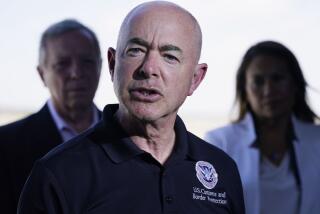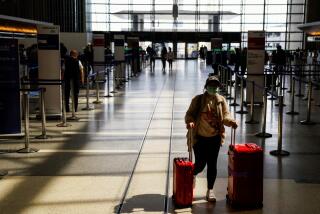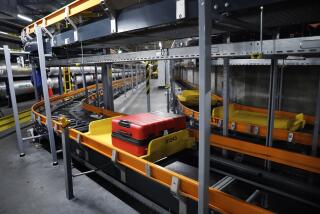A New Look to Counter ‘Invisible Threat’
- Share via
One minute the long, low room is an expanse of white floor. Then the human cargo of a jumbo jet spills out and the basement of the Tom Bradley International Terminal becomes a factory for moving people into America.
The passengers stack up behind a row of immigration stations that function like cattle chutes. Passing through one by one, the passengers crowd around a carousel to pick up baggage, then rush to another row of chutes manned by agriculture and customs officers.
Once, it was the responsibility of Ross Chappell, a 30-year veteran of the U.S. Customs Service, to soften this essentially brutal process. As the supervisor of passenger service representatives, he wore a customer-friendly business suit and responded to complaints from weary passengers chafing at the delay and intrusion.
Now Chappell is back in uniform and armed, a not-so-subtle indication of how his role has changed. “Now we are taking on more of an enforcement posture,” he said.
The officials once whisked all but a few passengers through with little more than a glazed nod. Now they ask everyone at least a question or two, looking for anything suspicious.
The tough new stance became particularly apparent beginning Nov. 30, when customs officers began searching the bags of every passenger arriving on about 28 airlines that have failed to provide computerized passenger information.
That’s 10 minutes per bag. Two hours to check 500 people from a jumbo jet--enough to grind the entire people-moving operation to a crawl.
As if that weren’t problematic enough, a string of incidents involving abusive and threatening travelers has also clogged the system.
There was the apparently drunken man who insisted on smoking. Customs officers met him at the gate. Another man just went bonkers and attacked a crew member. He came out of the plane in handcuffs. Both had a date with the FBI.
“It’s just a thing that has mushroomed,” Chappell said. He attributes it to the angst of the times.
“Most of them seem to fit the same pattern,” he said. “They’re either disturbed in some way or they’ve had excessive alcohol.”
A tall and imposing man who exudes authority, Chappell doesn’t mind revealing that his own inner calm has been jolted. Not only are there unstable passengers, there also are chemical and biological threats that could be waiting in the next bag or package.
“Every day, we are in the business of physical examination of people, baggage,” Chappell said. “It’s sort of an invisible threat.”
More to Read
Sign up for Essential California
The most important California stories and recommendations in your inbox every morning.
You may occasionally receive promotional content from the Los Angeles Times.














